Predaceous Insects: More On Organic Gardening and Insect Pests
- "Angels Of The Earth"
- "Predatory Wasp"
- "Lady Bug Larva"
- "Lady Bug"
- "Assassin Bug"
- "Ground Beetle"
- "Green Lacewing Larva"
- "Green Lacewing Adult"
- "Big Eye Bug"
- "Praying Manits"
Photos in this post have been taken from the internet. If I have taken a photo that belongs to you and that you do not care to share for this article please send me an email about it and I will take your picture down immediately. adina@manuredepot.com
In my Post Organic Gardening and Pest Control Issues I wrote about how I have dealt with vegetable garden pests in the past and now in the present.
I know that my paradigm seems extreme. My reason for coming back to this today is to report that I feel basically the same for my own purposes which are those of a backyard grower. I have done some mechanical pest control this season. That is I have picked new born caterpillars off of my tomato plants and I have been out at night finding and throwing cut worms out of the garden beds, and I have squished aphids at the tips of bean plants. I still don’t mix any sprays for pest control, and I am careful to consider what I am saving when I am squishing a bug to avoid killing pests on plants I have no intention of using anyway. This season I have spent less than one percent of my time on pest control, and lost less than ten percent of my harvest to insects.
While I want to generate surplus, the surplus I create feeds just a few other people who only expect to get what has grown as it is harvested so I am not under pressure to meet some projected harvest schedule. It is easy for me to accept some losses to pests in my vegetable garden in order to pursue the ultimate in a balanced ecosystem in my yard, and imperfect produce is a guarantee that I will not forget my own family while harvesting for others. We always eat the stuff that doesn’t look perfect. As you may know it still tastes great!
If it is your business to create food for a market system, and you need picture perfect harvests then there are many organic or OMRI Certified Organic pesticides available to you, as well as some very mild recipes for herb and soap, and baking soda sprays. However it is important to understand that even if you are mixing a substance that is safe for humans it is meant to be toxic to insects. It is nearly impossible when using such things to kill only the insects you intend sparing all others. Some insects or creatures you didn’t aim for will be destroyed as well, and you will have set yourself another step away from the balance we all seek in the garden. It is even beneficial to have some pests in the garden because it means that the predators that feed on those pests are also nearby. You are less likely to have overwhelming and devastating infestations this way.
If you are not a farmer who is depending on his harvest for his living I strongly recommend you learn how to sacrifice a little for the good of the whole. Balance in the garden is a very desirable condition. If you build strong and nutritious soil, choose the proper location for your crops, and plant appropriately for the season (cool weather vegetables in cool weather, warm weather vegetables in warm weather), and rotate crops from season to season you will have very little need for sprays and pesticides. What I am saying is with some knowledge and experience you can be a wise gardener, and you won’t need chemical magic tricks or synthetic weapons to bring forth a great harvest.
In the home garden it is a good idea to plant many different types of plants across several families, and it is a good idea to mix them up together with concern only to what plants might make poor companions. Otherwise mixed plantings will help in the garden to avoid large losses from pests and plant diseases. Please stay tuned for a post about companion plantings. Knowing which plants will benefit or do poorly in close proximity to one another is a great help in the garden.
Since last writing on this subject I have learned some more about predaceous bugs (our friendly army in the garden). There are many predatory insects that help to keep our garden pests in check. If you don’t spray any pesticides you are likely to catch them at work in your garden. Lady Bugs and larval Lady Bugs, some Stink Bugs, Predatory Wasps, Syrphid Fly larva, Spiders, Big Eye Bugs, Assassin Bugs, Ground Beetles, Praying Mantids, Lacewings and their larva, and Robber Flies are all predatory insect eaters feasting on the pests that might otherwise consume our garden vegetables.
There is a growing body of evidence suggesting that the presence of the almighty earthworm in our gardens may provide protection from soil born fungal plant diseases as well as some insect infestations. This of course in addition to the great nutritional benefit worms confer upon soil just by eating pooping and tunneling there helps our plants to be strong enough to survive attacks. If you move some earthworms to the vegetable beds be sure there is mulch on the surface for them to munch.
Bees in addition to pollenating our flowering vegetables have an unnerving effect on caterpillars who can not tell their buzz from the buzz of predatory wasps and so will drop off of leaves every time they are buzzed to avoid being eaten which severely disrupts feeding, and may cause them to give up on those planted areas altogether. Honey bees and predatory wasps are our great friends in the garden and their nests if not blocking household entrance ways should be tolerated.
Finally, it is a good exercise to accept that you are not in control of absolutely everything that happens in the garden. It is good to be humble there. It provides a sense of accomplishment and gratitude for what comes to fruit. I have had tremendous harvests for which to be grateful without the aid of any pest control sprays. You can too. Organic gardening is not about doing nothing to help your garden thrive and wishing for results while accepting unreasonable losses. It is about employing naturally occurring systems present in our environment so as to eat without doing damage to our ecosystem. It is about fostering interdependence with our world rather than conquering and ultimately destroying it. This is not mumbo jumbo new age magic, it is solid science with practical applications, it is stuff we knew once and forgot along the way. You can do this too.
For those of you who need to control pests in your yard and garden here is an excellent link to Arbico Organics. They have some excellent products including beneficial nematodes for flea control.
Here’s to Balance in Your Garden: Cheers!
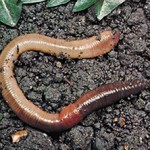
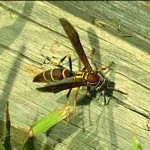
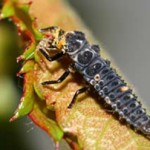
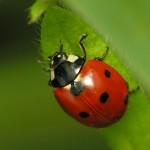
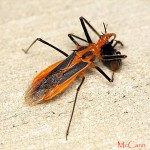
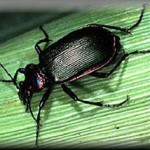
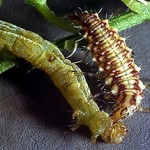
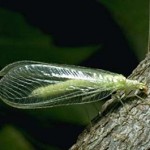
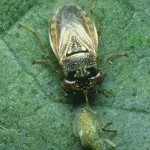
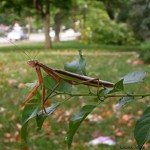

4 Responses
I live and believe in the same things you do..
awww shucks, thanks for your comment Danny.
Do you know if there is an organic/natural pest control for ticks? I am interested in organic gardening in my yard, but must have the yard professionally sprayed for ticks, otherwise my dog is covered in them(even with tick collar and top spot tick application). My yard in VB is adjacent to 2 acres of piney woods.
Great question Jeanne, I am afraid I don’t have the answer you want. What I would recommend is that you stop spraying your yard, treat your dog, and be vigilant about picking the ticks when they are on him/her. Here is why: Usually we have a tick season. For us it is in the fall, some years we get a few in the spring (We live in the pine and oak woods, and on the edge of the woods there are deep grasses going back to the canal.). Even in the tick season our dogs only get a few ticks, and they are out there frequently, and we don’t use tick control meds on them. We also don’t spray any poisons on our property ever. I don’t know specifically what predators eat ticks, but they have to be part of the food chain. I believe that your regular yard spraying has set up a sort of rebound tick population. That the spraying has inadvertently destroyed the predators that would normally keep the tick population in balance, and I would also guess that whatever spray your service is using is no longer effective on the ticks you have there. A similar thing happened to my neighbors parents (who lived next door to my neighbors) when they quit spraying the yard for fleas. The flea population was out of control and had to be sprayed constantly. Once they quit spraying the fleas surged for a short time and then quit being a problem.
I realize that what I am suggesting takes a great leap of faith, but I think you are capable of such things, since you are asking these questions. Good luck.